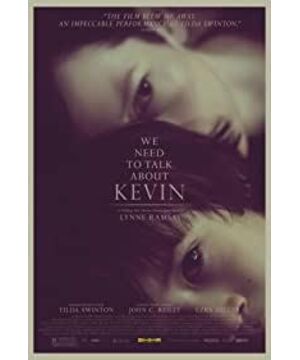After watching this movie, I thought for a long time, and repeatedly recalled and thought about many plots in the movie. The first time I watched this movie, I couldn't help but put myself in the shoes of the show's mother. From the perspective of the mother in the play, Kevin is really annoying as a child. From the moment of birth, this child has been uneasy. The child was crying all day and all night, and Eva couldn't coax him well enough to calm him down. Most people can tolerate the occasional time with a crying baby; it can be maddening to be with such a "noise maker" every day, day and night. Although Kevin kept crying in infancy, it was most likely due to the lack of the right amount of trace elements in the body, as well as the lack of touching and hugging, but I think that even so, Eva can bring Kevin from birth to It's really not easy to walk.
By the time they can walk, infants and toddlers begin to have a complete sense of themselves. Kevin is not autistic, but refuses to speak to his mother Eva. It is true that Eva did not give Kevin normal, complete and unconditional maternal love, but Eva did everything a mother should do to a child in her actions. Eva stayed at home every day watching the child Kevin, cooking for him, doing laundry, changing diapers, and playing with the child. Due to the time limit of the movie, the past experience of Eva in the novel is not clearly explained. Eva was born and grew up in an unhealthy family. Her father was not a competent father, and her mother had a mental illness, so she could not give Eva a normal and healthy maternal love and family environment. Eva herself is afraid of parent-child relationships, so she doesn't want children. But her boyfriend, her future husband Franklin, wanted a child and a traditional family. Therefore, Eva's heart has always been very conflicted. Her reason tells her that if she wants to maintain a stable and warm relationship with Franklin, she must have a child; but her subconsciousness is that she really doesn't want to. Everything is for the children. Eva is a person who is naturally free and unwilling to be bound. Having a child, becoming a housewife, and giving up work are serious constraints for Eva.
As he got older, Kevin became more and more like a normal, ordinary kid. Although Kevin confronted his mother Eva as always and annoyed her, adolescent children, male or female, somewhat like to confront their parents, so Kevin's behavior in adolescence did not attract much attention from others. However, in fact, Kevin's heart has not changed much. Kevin lacked maternal love since childhood and yearned for it. Everything he did to irritate Eva from childhood to adulthood was to attract the attention of his mother and gain maternal love.
The love of a parent for a child is not automatic, because the child is born from the womb, it will be there. Love is an ability. The love of human parents, grandparents, and even relatives for their children is a high-level thinking emotion, including but not limited to the "calf-protecting" emotion of ordinary animals. The ability of living things (including ordinary animals and humans) to protect their offspring is controlled by genes, but "love", as a high-level emotion, is unique to humans. This ability needs to be learned to master.
The first source of the ability to learn to "love" is the environment in which a person is born and raised. In most cases, this environment is a family environment, a cultural and material environment composed of some blood-related people. If a person has felt the love of his parents or others, he will know that there is such a thing as "love" in the world. If a person has not felt love since birth, then he must not know what "love" is, nor have the ability to love. Human beings, as a kind of different, advanced creatures with advanced intelligence, who have created extraordinary culture, have emotional needs. In particular, it takes a long time for human individuals to learn human life after they are born. Instead of being like horses and cows, ponies and calves can migrate with the population as soon as they are born. Human individuals will be the closest and most familiar after birth. People have emotional needs and want love from them. The love of parents for their children is not a biological instinct, but a socialized and advanced thinking ability, while the love of children for their parents is a biological instinct and innate.
Due to the influence of the bad family of origin, Eva in the play does not have a complete and healthy ability to love her children. But in the process of giving birth and caring for her first child, Eva learned how to get along with her children and slowly developed her ability to love her children. Eva and second child Celia have a healthy, normal mother-daughter relationship. But Eva's first child, Kevin, wasn't so lucky. When Kevin was born, Eva was still very young, reluctantly gave birth to him, raised and cared for him, and had no experience in caring for children when she lacked the ability to "love children". It is precisely that Kevin also inherited Eva's character of not revealing emotions, perfectionism, freedom-loving, and courage to fight to a great extent. It was Kevin's birth that shackled Eva's life and dreams. Eva did take out her dissatisfaction on Kevin, but it was also Eva's suffocating indifference to Kevin that caused Kevin to resist and let himself The fire of inner freedom erupted.
After thinking about this movie several times, I think Kevin is really pitiful. He lacked maternal love since he was a child, and has been living in a cold and stressful family environment. He has no one to turn to. And it is very likely that he himself did not realize that his character and the way he interacted with his mother were problematic. There are some comments online that Kevin has an Oedipus complex, and I don't think it's that far yet. Kevin's lack of maternal love has nothing to do with his gender. Whether it is a boy or a girl, it is possible to yearn for maternal love but not get it, which is "lack of maternal love". Only when there is a sexual impulse towards one's mother can it be regarded as an "Oedipus complex", which is possible for both heterosexual boys and gay girls.
Often, children who chronically crave their parents' attention and don't get it also crave the attention of others. In the film, on the eve of his 16th birthday, Kevin used bows and arrows to slaughter nine classmates and teachers in a premeditated and planned manner. Reports win the attention of the world. Kevin hopes to gain mother's love by attracting his mother's attention since he was a child, but he has never been successful. After the birth of his sister Celia, he feels his mother's love for him is being taken away again. Kevin never wanted to have a brother or sister, and he never liked Celia. A child's desire for motherly love is innate. Kevin not only lacks maternal love since childhood, but also has a strong possessiveness towards his mother Eva. As a child, Kevin was destroying his mother's private space by destroying his mother's beloved map that plastered the walls of the room. In layman's terms, Kevin was jealous that those maps took away his mother.
Kevin has a love-hate relationship with his mother Eva. Children's love for their parents, especially their mothers, is transformed from attachment from birth, or it can be said to be innate. Kevin loves his mother Eva. In the movie, the adolescent Kevin stands outside the bookstore on the street and looks at the poster with his mother's photo, which clearly expresses Kevin's love for his mother and his love for his mother. desire. After being discovered by his mother, Kevin strenuously denied it. Kevin, like Eva, is a very self-respecting person and very competitive. Kevin didn't want his mother to feel like he loved her, and he didn't want to be at a disadvantage in a long battle with his mother. Kevin, of course, hated Eva. Eva's rough behavior towards Kevin in his childhood and his indifference over the years had caused serious psychological trauma to Kevin. Kevin hates Eva for a good reason.
Kevin has a love-hate relationship with his mother, Eva. So does Eva love her son Kevin or not? Of course love, but it was only after the birth of the second child that she slowly began to love her children (including Kevin and Celia), and she really realized that she loved Kevin because Kevin committed a crime and was imprisoned. After going to prison, her husband and daughter were killed. Eva really didn't love Kevin as a baby, as a child. Eva's ability to love her children also develops slowly. As a child, Kevin did not feel love during the most critical period of emotional development, which is really pitiful.
The film review is almost finished, and I have to mention Franklin here. The husband and father Franklin in the play looks like a good old man, but in fact he is a "bad catalyst" that leads to the gradual extreme polarization of Eva and Kevin. In love and marriage, Franklin and Eva seem to have a solid relationship, but in fact he doesn't understand Eva's deep character at all. He didn't understand Eva's great desire for freedom, and he didn't want to communicate with Eva, or listen to her to share her mental pressure. In the parent-child relationship, Franklin never knew the real Kevin. He imagined Kevin as a shape in his mind, and then leaned Kevin on that shape. Like Eva, who never knew the deep character, Franklin never thought to meet the real Kevin. People like Franklin simply ignore the problem, avoid it, and don't admit it exists. But this world is not idealistic, it is not that if you do not acknowledge the existence of problems, problems will disappear. Problems will disappear only when they are solved. Blindly avoiding problems will only lead to more and more serious problems. At a certain moment, these more and more serious problems will explode, causing the entire looking building to collapse.
The above analysis is so much, it is inappropriate not to give a solution. From Eva's point of view, first of all, you must cure your own psychological problems and get rid of the adverse effects of the original family on yourself; secondly, you must strengthen your heart, your will must be firm, and you must fight for your career if you want to. If you don’t want to have children, don’t give birth and don’t raise them. You can’t make yourself take all the responsibilities in order to meet the needs of others. Third, choose a mate carefully. If your core concepts are inconsistent, don’t continue. For example, Eva in this play I don’t want to have children, but my boyfriend Franklin definitely wants it. If I were Eva, I would break up decisively. Fourth, I must marry and fall in love with someone who truly understands me and has the right personalities. Otherwise, it will be very painful. .
From Franklin's point of view, first of all, we must admit the existence of problems, face reality and solve problems, and we must never live in our own fantasy "beautiful world" that rejects the existence of problems; secondly, we must use our heart to understand others, at least Be attentive to understand the character of your family and children; third, don't force your boyfriend, girlfriend or spouse to do things they seriously refuse to do; fourth, it is better to break up with an unsuitable spouse early.
From Kevin's point of view, first of all, be calm, analyze your relationship with others more, and don't fall into emotional misunderstandings forever; secondly, learn more about social, humanistic, and medical information and research materials, Learn more about the outside world and the lives of others, and don’t just limit yourself to the small family environment where you grew up; third, if you really don’t get along with your parents, become independent as soon as you become an adult, move to a place far away from them, and keep contact as little as possible; fourth , long for love but can't get it, try to get love in another way, find other people who love you, or look down on the relationship and no longer hope to get love.
Watching the full movie, the most innocent person in this small family is Celia. Although Celia didn't have much affection for Kevin due to Eva's teaching, only a little child's playmate, but I still like Celia quite a bit. Celia has a cheerful and lively personality, and does not take words that belittle her to heart. She does not inherit Eva's excessive self-esteem and excessive perfectionism. She is a cute and caring little angel. And Celia wasn't noisy in infancy and childhood, not as loud and annoying as Kevin was when he was a kid. It's nice to have a girl like Celia.
View more about We Need to Talk About Kevin reviews











